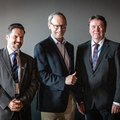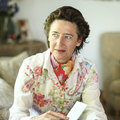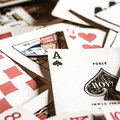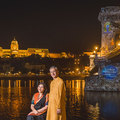What makes us really rich? How do we derive advantage from diversity? What can we learn from the experienced Swiss ambassador? One thing is certain: There are more bridges connecting than rivers separating us. Exclusive Christmas interview…
 Photo by Jeshoots.com
Photo by Jeshoots.com
+++ Kattints ide a cikk magyar változatának olvasásához! +++
Take a Look Behind the Scenes…
For many, diplomacy is a mysterious, obscure, and boggy area. There is hardly anything to know about the negotiations – dancing on the sharp edge of the sword and striving for mutually beneficial solutions – behind the events playing in front of our eyes, as well as being in the crossfire of various political and economic forces.
However, it is exactly these highly educated, intelligent diplomats and their enthusiastic, devoted staff who, in the midst of the overwhelming deluge of information and fake news, safely build the framework of peaceful international cooperation in the background.
Neutrality and (Pro)activity
My articles include thoughts and stories by authentic personalities (ambassadors, attachés, and other members of the diplomatic corps, as well as well-known and respected persons) who carry out their jobs as a true mission to build and develop international relations in the interests of fruitful cooperation. One of them is the Ambassador of the Swiss Confederation to Hungary, H.E. Peter Burkhard, who is taking us on a journey through the mysterious and exciting world of diplomacy.
Switzerland is famous for its neutrality. However, you are very passionate about building international bridges. Where is your approach to things with a positive and curious attitude, as well as your eagerness for cooperation rooted? Why did you choose this métier?
Concerning the first aspect, I would like to clarify the following: Neutrality means that a state does not take part in armed conflict. It does not mean neutrality of opinion, and it does not mean abstention from actively participating in shaping the world.
Switzerland is pursuing quite an active foreign policy, and this is enshrined in its constitution. The latter stipulates that the Swiss Confederation, among other things, shall assist in the alleviation of need and poverty in the world and promote respect for human rights and democracy, the peaceful co-existence of peoples, as well as the conservation of natural resources.
As you see, this is not at all in contradiction to my personality and the passions that you ascribe to me, on the very contrary. And yes, my interpretation of my métier goes exactly in this direction. It is true, though, that many of my assignments were not in traditional fields of bilateral diplomacy, and maybe with a greater focus on “moving things forward”. This includes three mandates as Head of Mission of OSCE (Organization for Security and Cooperation in Europe) operations, namely in Ukraine, Azerbaijan, and Serbia, and earlier posts in special Task Forces of the Swiss Foreign Ministry. I participated in the work of the Task Force for the Swiss OSCE Chairmanship 1996, and subsequently, I worked for three years as Chief of Staff of the then “Task Force Switzerland – World War II”. The role of the latter was to coordinate all government action concerning claims related to the role of Switzerland, its National Bank and Swiss enterprises, notably banks, during World War II.
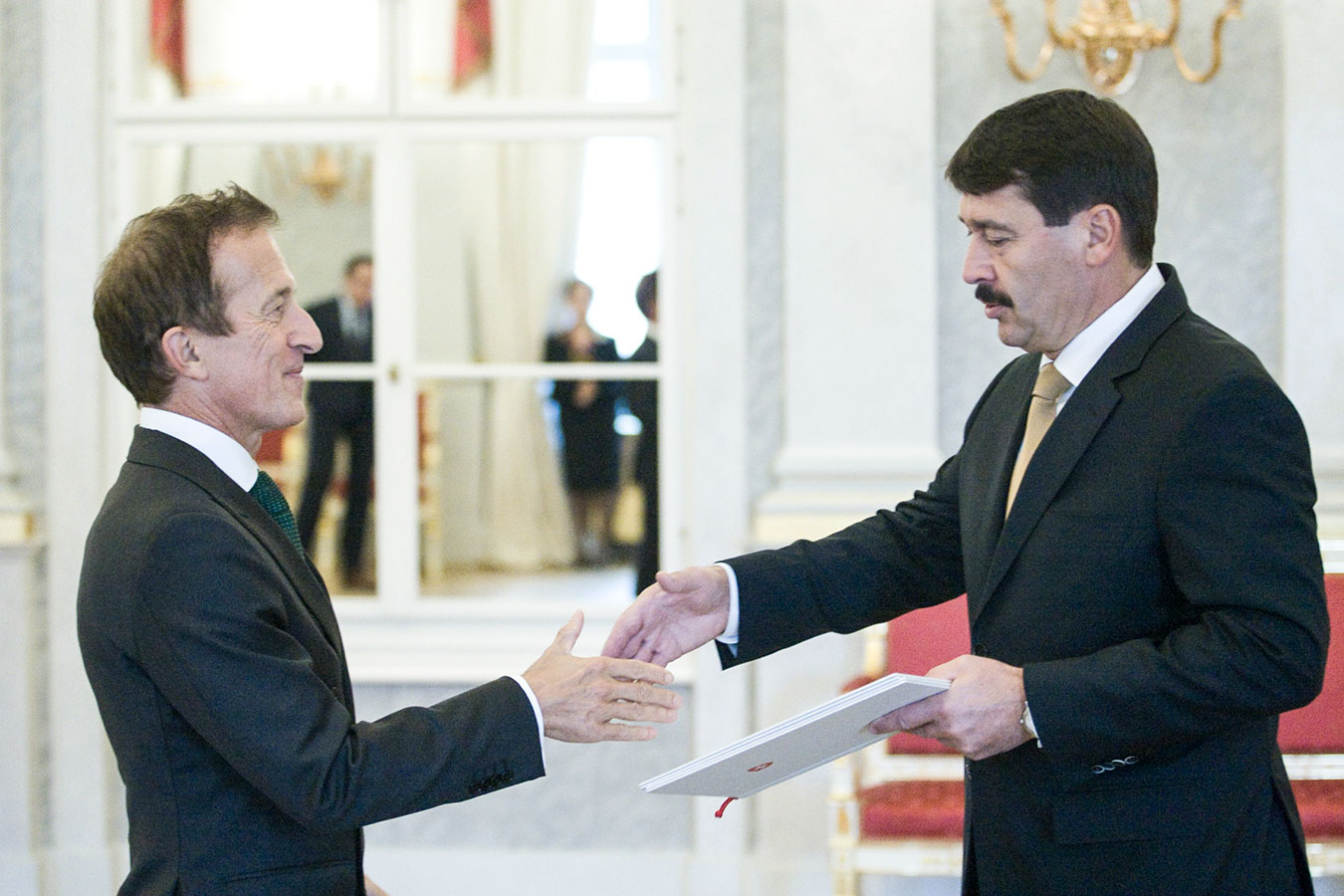 Presenting his credentials to Hungarian President János Áder (19.10.2016) (Photo by Dávid Harangozó)
Presenting his credentials to Hungarian President János Áder (19.10.2016) (Photo by Dávid Harangozó)
Swiss “Concordance-Grade” Lifestyle
How does the unique federal organization of your country, the very strong integration of the people in the everyday decision-making support the Swiss way of life? What are you especially fond and proud about when thinking of your homeland?
If you search the Internet for “Swiss way of life”, you may find interesting comments about habits of eating, drinking or dressing, about Dos and don’ts in social interactions, or about things like e.g. the high value that we place on public transportation, on healthy lifestyle, and on outdoor activities.
That is obviously not, what you have in mind; you rather refer to political culture. This is a vast subject so I will try to sketch just a few traits of it.
Switzerland has a remarkably nonhierarchical social order, there is a deeply rooted skepticism vis-à-vis political authority (and authority in general), and on the other hand, there is a high level of civic responsibility. There is a dislike of conflict and a desire for what we call “concordance”. The political institutions reflect and correspond to these expectations and attitudes.
Swiss political structures strive to be close to the people and to respond to the wishes of the citizen. So when thinking about Switzerland, it is in first line this bottom-up character of our political system that I could be fond of, and I might feel some pride that Switzerland has been able to maintain the key elements of the Swiss civic society and state since quite some time.
This is far from self-evident, given the profound changes the world has been undergoing, but particularly also in the light of the fact, that for more than a hundred years now, with the exception of the two World War periods, Switzerland always had a share of a foreign population of some 20%. The integrative force of the Swiss society and political system seems to be very high.
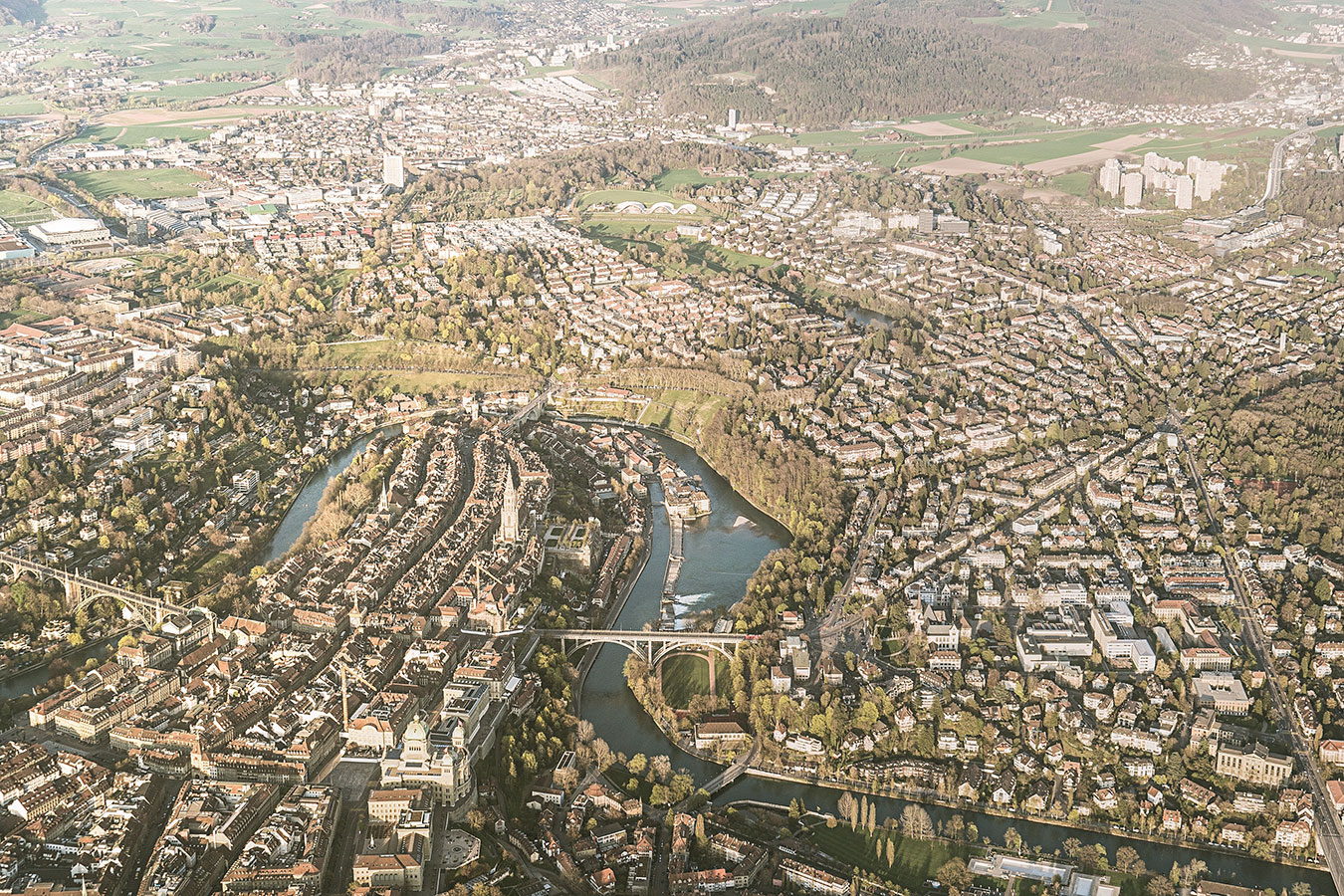 Aerial view of Bern, the capital of Switzerland (Photo by Nicolas Jossi)
Aerial view of Bern, the capital of Switzerland (Photo by Nicolas Jossi)
+++ Have you lived or ever been to Switzerland?
Share your experiences and stories in a comment below. +++
White-Crossed National Identity
What are the advantages and handicaps of multilingualism and/or multiculturalism that constitutes a major pillar of the Swiss society?
The Swiss national identity is not based on language or culture, or, if so, then only on its political culture. Different parts of Switzerland belong to the areas of various great European cultures, which is the basis for a wide range of enriching interactions and exchanges. Although usually, Swiss school children acquire at least some basic knowledge of a second national language and often also of a third foreign language during their compulsory school years, the image of all Swiss being quadrilingual is a myth.
It is true, however, that in international comparison the share of people knowing several languages might be higher in Switzerland than elsewhere. Nevertheless, I would also dare to say that the rhetoric skills of Swiss are usually not particularly high. I do not know really why, but maybe this is somehow related to the fact that our national identity is not based on language, or to the rather egalitarian nature of our society.
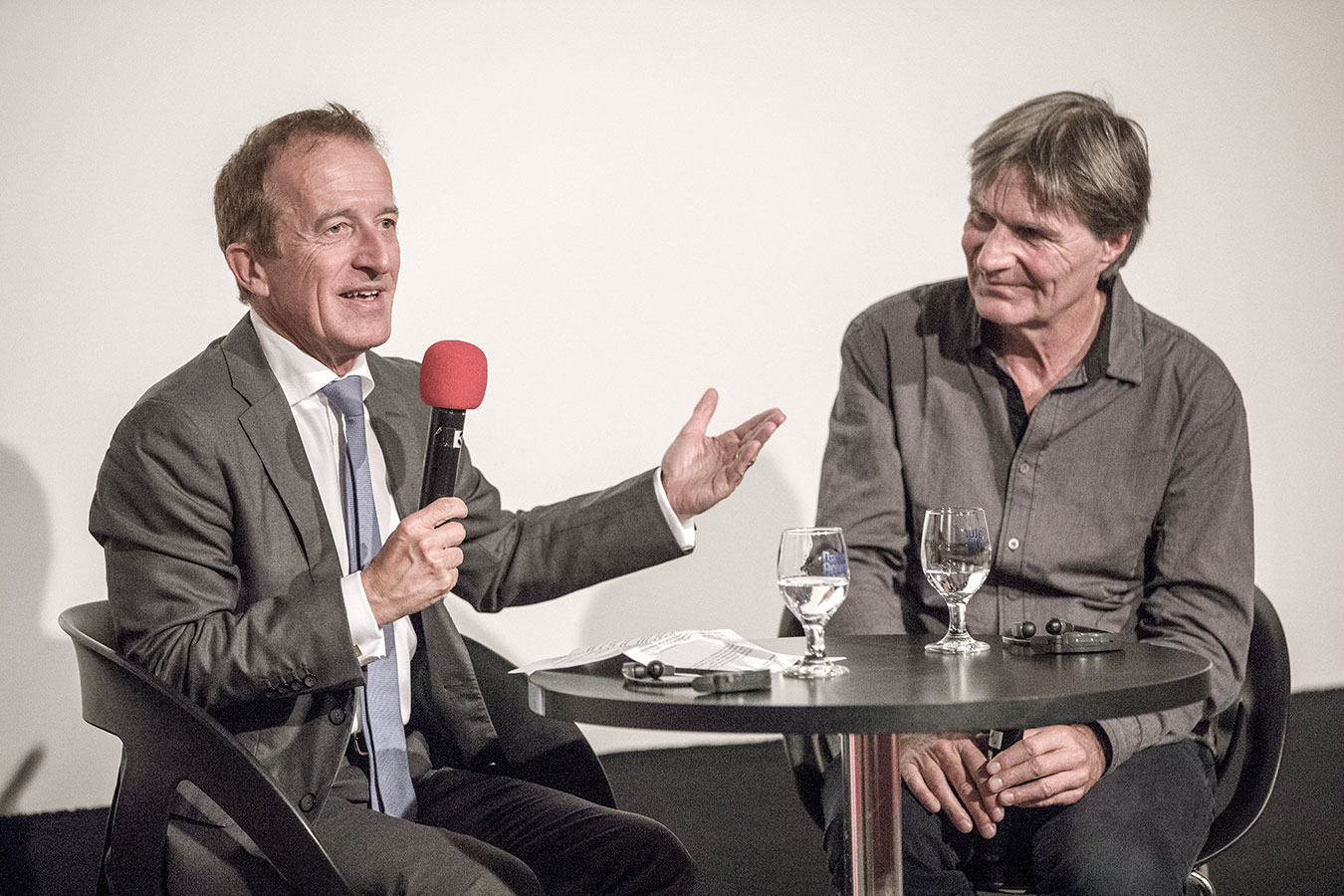 The ambassador interviewing director Dieter Fahrer at the 'Sehesnwert' film festival (Photo by Zoltán Kerekes)
The ambassador interviewing director Dieter Fahrer at the 'Sehesnwert' film festival (Photo by Zoltán Kerekes)
Developing Well-Established Relationships
What were/are the main objectives of your mission in Hungary?
It is customary that at the beginning of each year, we define some goals and objectives for our mission in our respective host countries in discussions with our Foreign Ministry in Bern. I am currently thinking about what we might specifically try to achieve in the course of 2019 with regard to our relations with Hungary. Of course, this is to be seen in the framework of a longer-term perspective, it is about building upon the existing fundaments, in particular developing further the good relations namely in the economic but also in the cultural sphere.
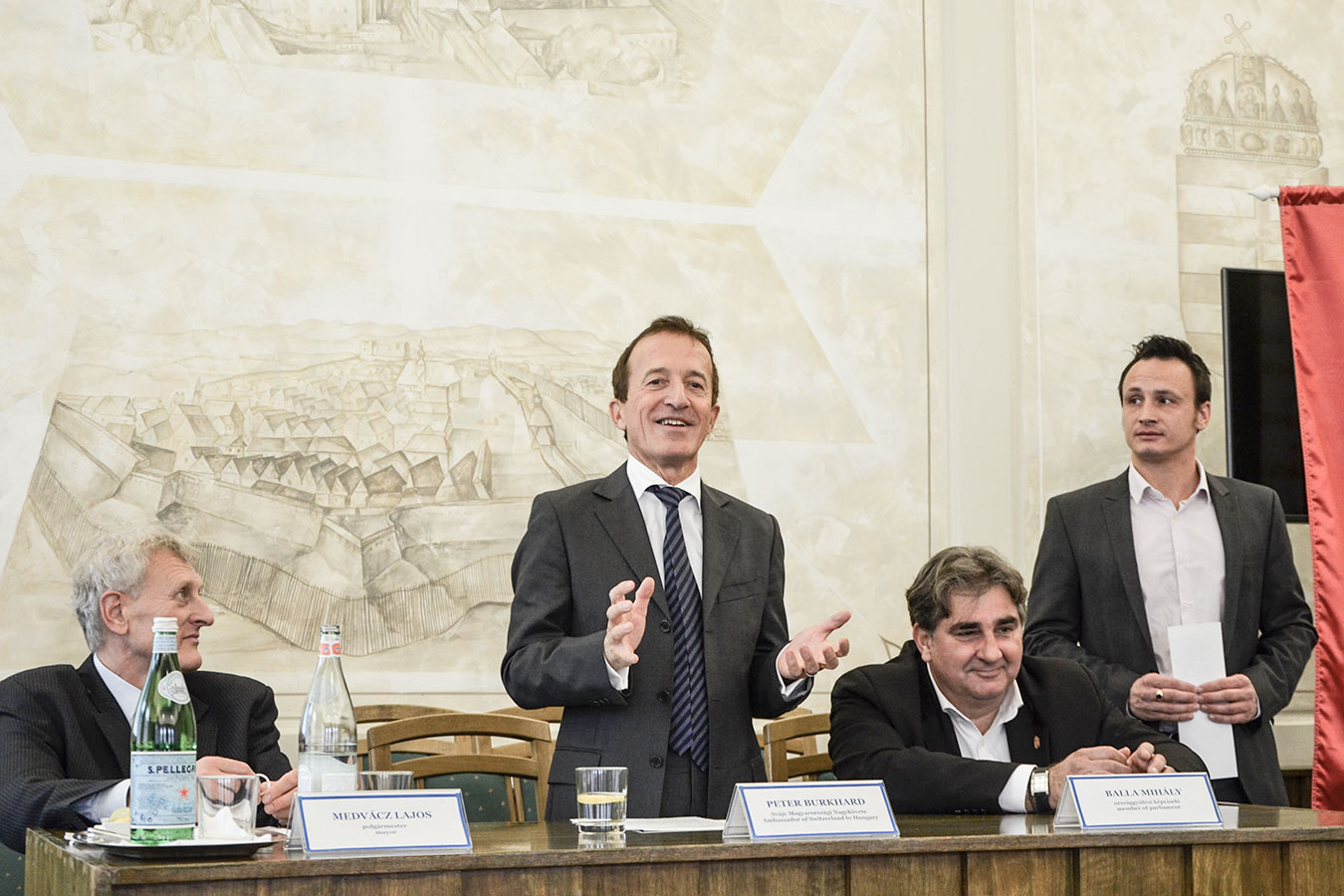 At the closing ceremony for the project 'Rehabilitation of the Drinking Water Supply of the City and Region of Balassagyarmat' (07.11.2016)
At the closing ceremony for the project 'Rehabilitation of the Drinking Water Supply of the City and Region of Balassagyarmat' (07.11.2016)
Collective Experiences
What is your overall impression of Hungarians?
I do not like collective judgments. The diversity between people belonging to a given social group or, in this case, nation is always bigger than the diversity between these groups or nations. However, what I am trying to study and to understand (and I even might endeavor to come to some assessment) is the way how this collective is acting as a collective, how it organizes itself and how it is defining, pursuing and achieving collective goals.
In order to get a deeper understanding of the Hungarian society, I still lack a key instrument of insight, namely the language. I start reading news, I can grasp at least the general thrust, and I am about to start watching movies. A few days ago, I saw the new film ‘Sunset’ (Napszállta). Of course, the English subtitles were of help, but I had the impression that I could follow the dialogues. Coming back to your question about my objectives, achieving a sufficient level of semantic and not only syntactical understanding of the Hungarian language is clearly one of them.
+++ Do not miss other interviews and reception reviews! Click the KÖVETÉS button in the upper right corner… +++
Diplomatic Family Model
A career in foreign service poses a great challenge for a diplomat having a family. What is your experience?
It is a great privilege to serve one’s country as a diplomat, and I could not imagine a more fascinating profession. Moving with your partner or your family from one country to another, changing not only your physical but also your social environment every few years is not a challenge in itself, or you can even see it as an element of the attraction of this way of life. However, combining two professional careers, if one of the two parts of a couple is pursuing a diplomatic career, is very difficult. This was not an issue in old courtly traditions, and diplomacy has its roots in the monarchic state system, but in nowadays world, with life plans of modern men and women, this poses a problem. I am not aware of any Foreign Ministry that has found a solution to it; for sure, we in Switzerland have not.
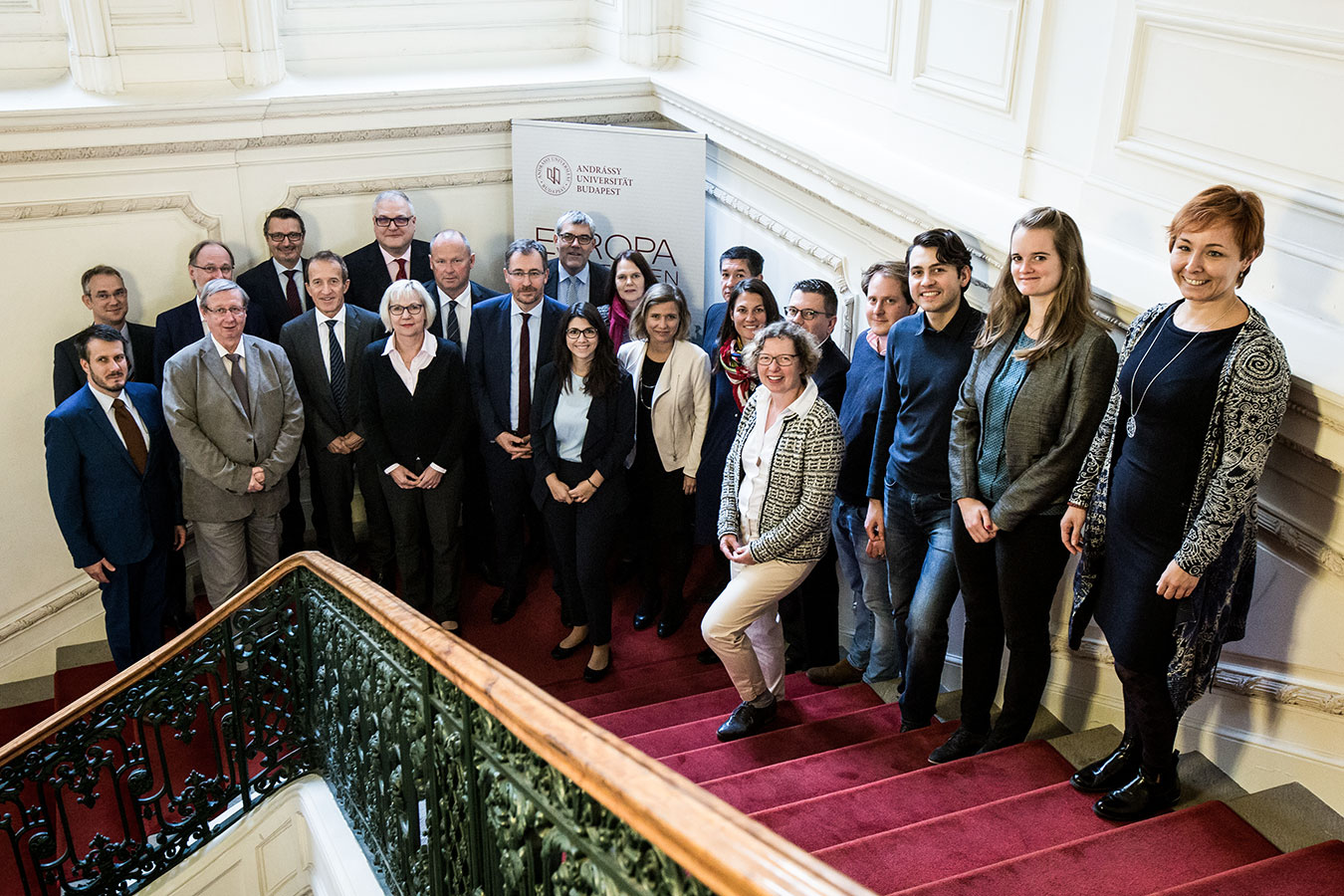 Official visit of a Swiss parliamentary delegation (Foreign Policy Commission of the National Council) in Budapest (Andrássy University, 26.10.2017)
Official visit of a Swiss parliamentary delegation (Foreign Policy Commission of the National Council) in Budapest (Andrássy University, 26.10.2017)
Christmas Around the World
How do the Christmas preparations look like at the Swiss Embassy that houses not only your office but your residence, too? How and where do you usually spend the holiday season? Are there any special traditions in your family?
My wife and our child are currently staying in Kiev with the parents of my wife, and I will join them for the upcoming holidays. Last year, when we were all together here in Budapest, we had some quite traditional Christmas decorations in the residence, i.e. a Christmas tree with ball ornament etc. However, this year, I must admit, I was not thinking of it.
When I was a child, our family always spent Christmas with my grandparents in a small village in Southern Germany, which left deep memories with me. Later, in student years, I often went skiing over the Christmas/New Year period.
Then followed years when I was in countries with other traditions, the first time for a longer period, when I worked from 1985 until 1986 in Novosibirsk as a scientist. There New Year was a great thing, but Christmas went unnoticed as it was customary in the USRSS back then in socialist times.
In the former Soviet Republics with Christian roots, notably Russia and Ukraine, where I worked as a diplomat in subsequent years, it has become different.
On the other hand, in Azerbaijan or Uzbekistan, where I was heading diplomatic missions later on, religious holidays followed the Islamic tradition.
However, even if a country with Christian traditions, like in the case of Cuba, where I served as Swiss Ambassador some ten years ago, Christmas has quite a different character, if temperatures are tropical. While in Havana, I used to go to the beach for swimming on Christmas Eve.
I must add, though, that throughout the more than 30 years of quasi-nomadic life, I always tried, to the extent that calendars and work schedules permitted, to pay a short visit to my parents in Switzerland, when they still were alive, if not at Christmas then at least around Christmas time.
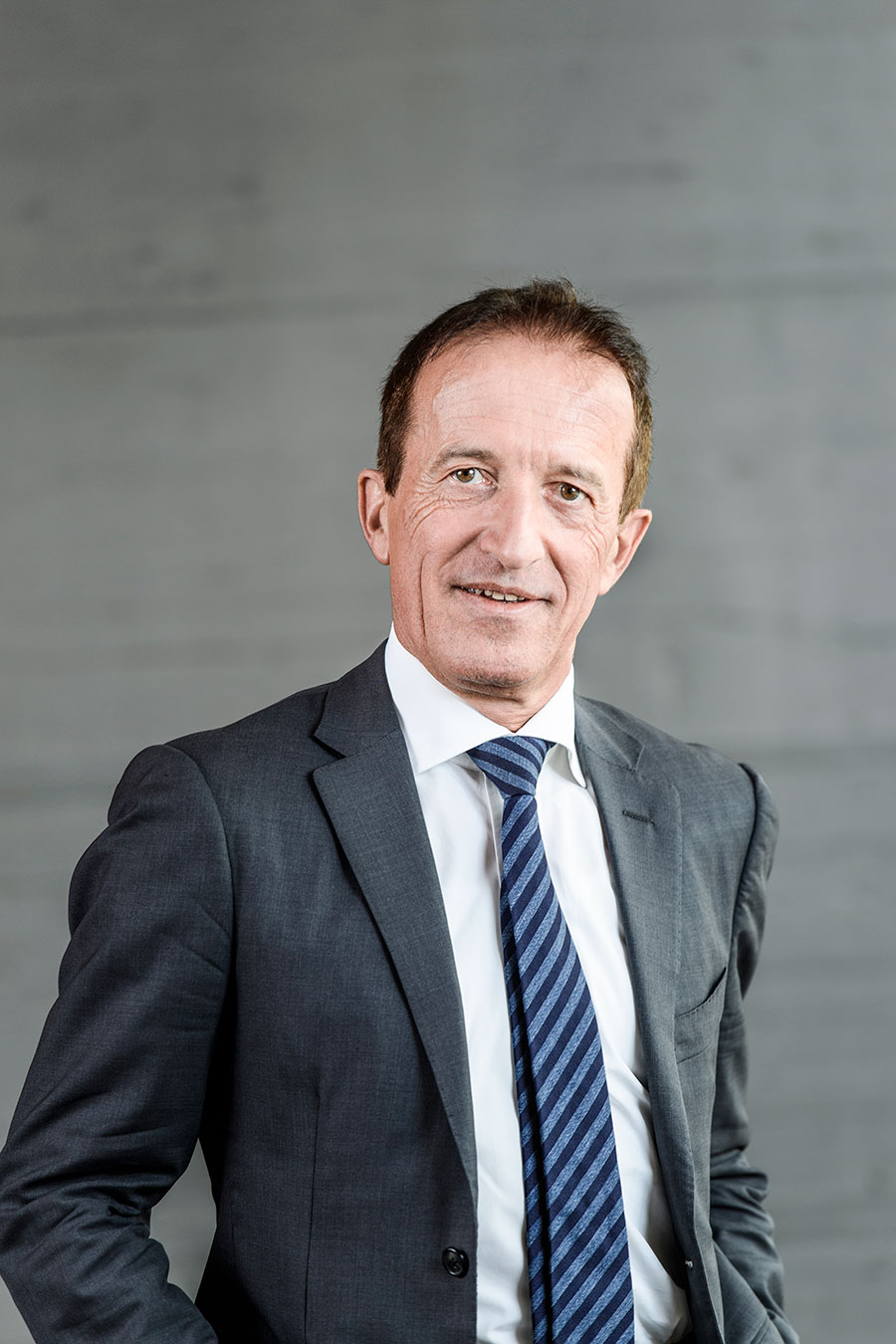 Photo by the Swiss Federal Department of Foreign Affairs
Photo by the Swiss Federal Department of Foreign Affairs
Challenges of Our Time
What is your wish for both Christmas and the New Year? In your opinion, how can we achieve further personal growth and professional progress in 2019?
It may sound pathetic but my biggest wish to you and your readers, to all the people close to me, to my staff, my family and myself, too, is good health.
As regards your second question, I am not sure whether I have a particular legitimacy to provide some advice. There seems to be a general perception that we live in times of fundamental changes. One of the things that seem to be challenged are the achievements of enlightenment. Therefore, instead of giving my own opinion, I would like to respond with the famous quote by Immanuel Kant, which in these times might serve as some kind of guidance: „Enlightenment is man's emergence from his self-incurred immaturity. Immaturity is the inability to use one's own understanding without the guidance of another. This immaturity is self-incurred if its cause is not lack of understanding, but lack of resolution and courage to use it without the guidance of another.”
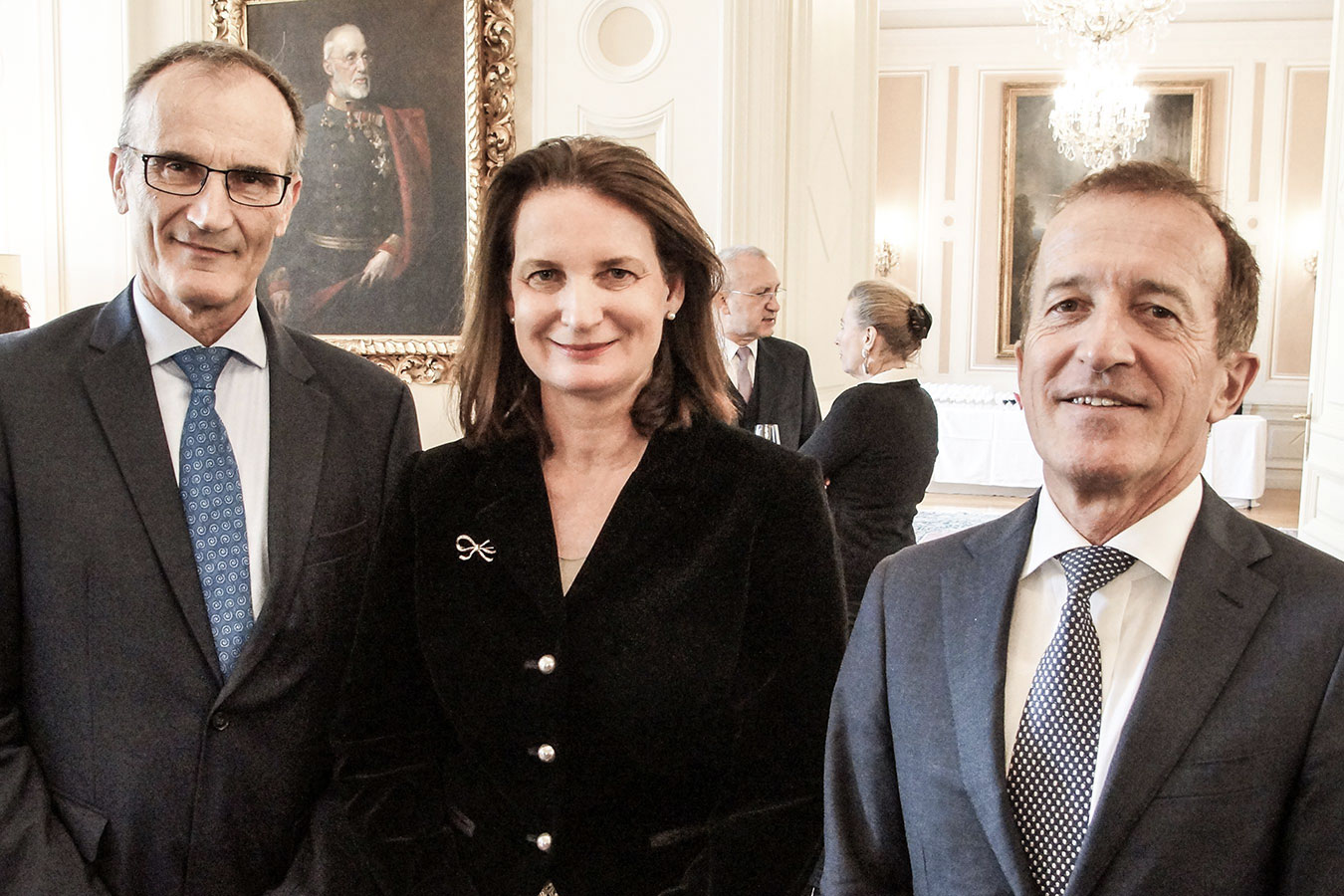 With German Ambassador Volkmar Wenzel and Austrian Ambassador Elisabeth Ellison-Kramer (Photo by Ivan Aigner)
With German Ambassador Volkmar Wenzel and Austrian Ambassador Elisabeth Ellison-Kramer (Photo by Ivan Aigner)
Related Articles
Check out other related articles. Click either the pictures or the titles highlighted in black below… >>
|
|
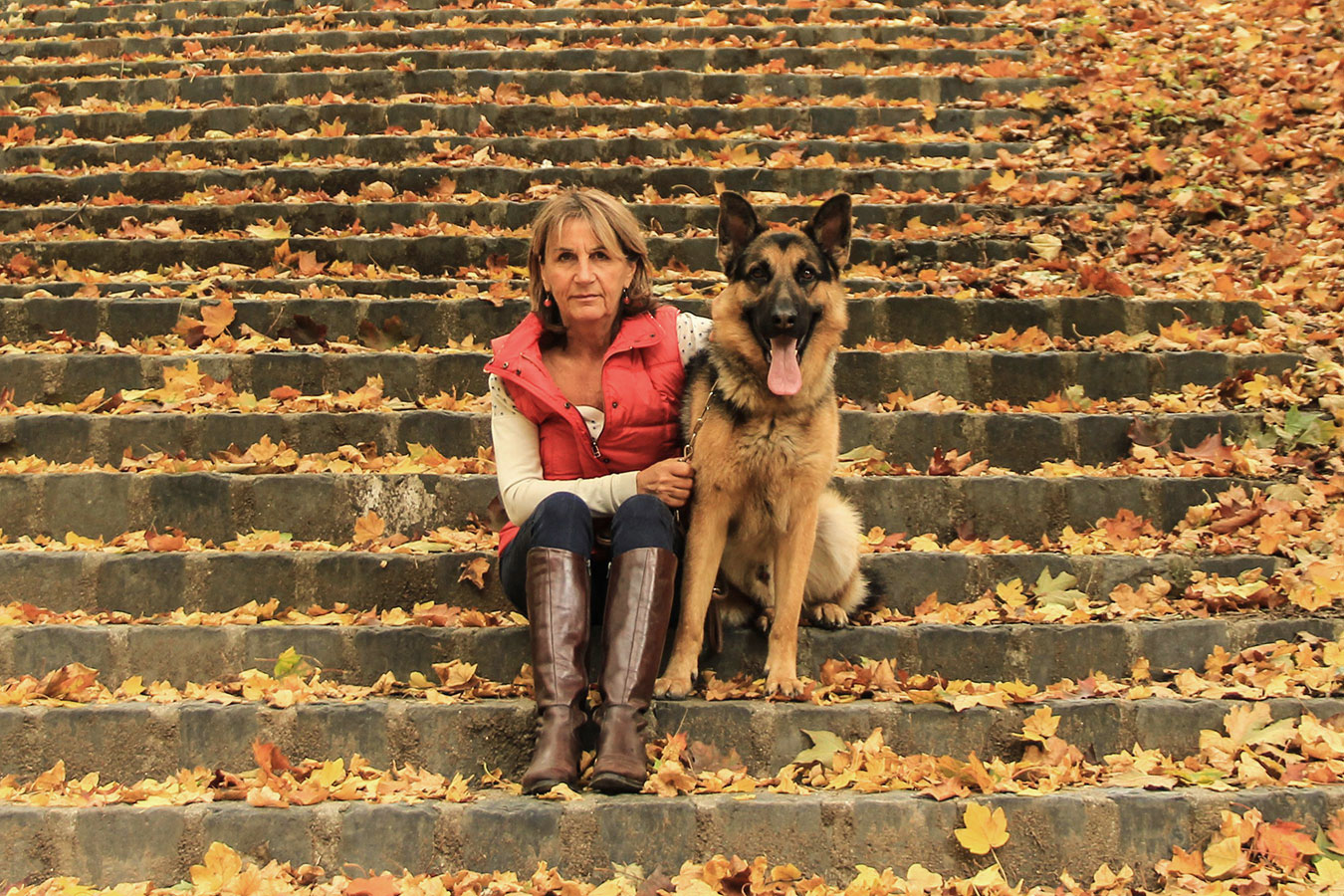 >> Belgian Ambassador Reveals the Trump Cards of Diplomacy << >> Belgian Ambassador Reveals the Trump Cards of Diplomacy << |
Useful Links
Do you want to know more about India, the operation and mission of the Embassy of Switzerland in Hungary? Are you interested in Indian-related programs and events? Visit the Official Website of the Swiss Embassy...
♦ ♦ ♦ ♦ ♦
✅ Do you like the article? Like and share it!
⛔ Any constructive opinion? Let it flow out! Write a comment!
❓ Are you curious what other exciting and interesting articles are coming up next? Definitely click on the FOLLOW button in the upper right corner!
➕ Are you wondering who pulls the strings in the background? Are you keen on getting more details? Join me on Facebook and Instagram!
Like me on clicking at www.facebook.com/diplomaciamindenkinek!
♦ ♦ ♦ ♦ ♦
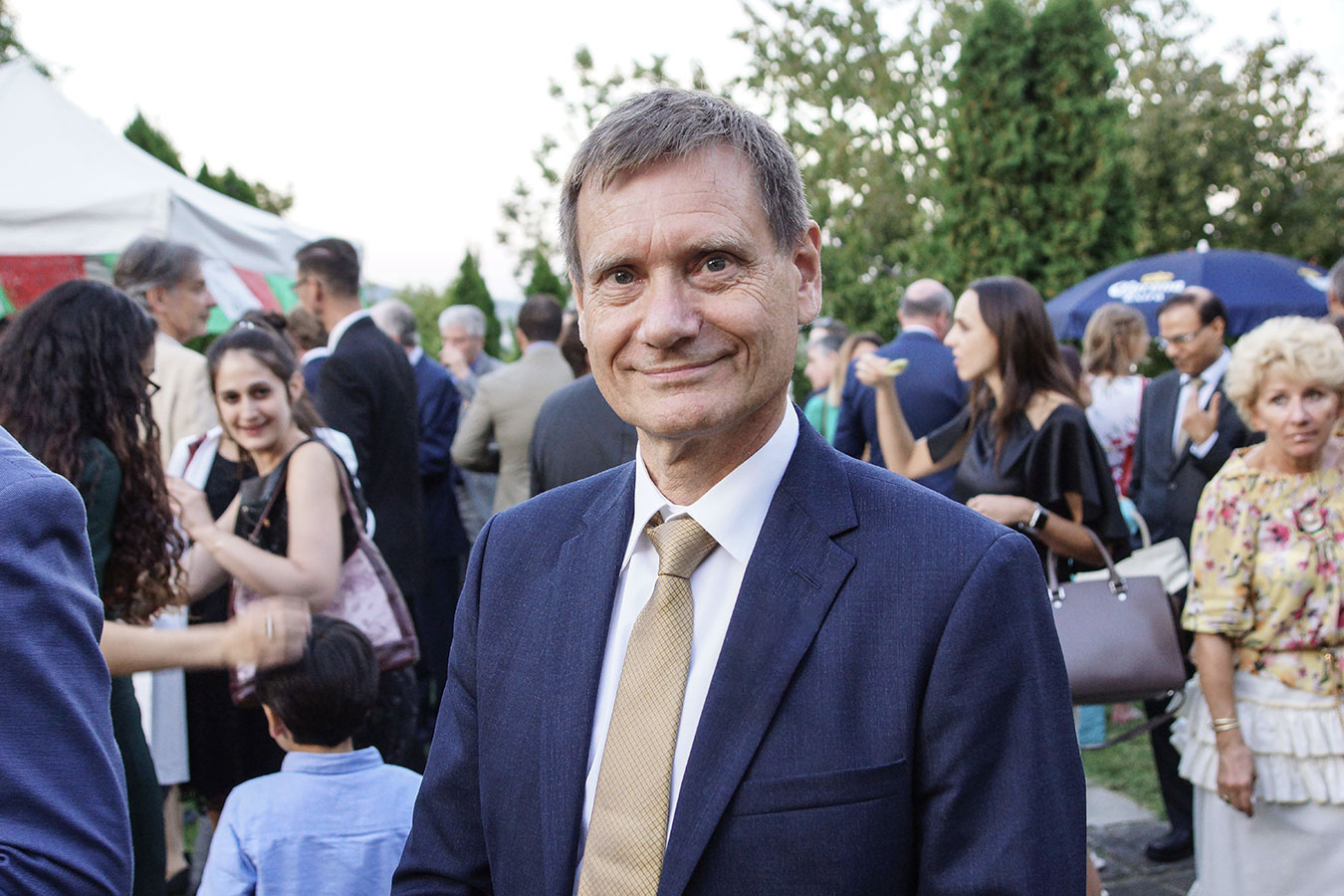 >> Diplomat and Father at the Service of the King of Norway <<
>> Diplomat and Father at the Service of the King of Norway <<
